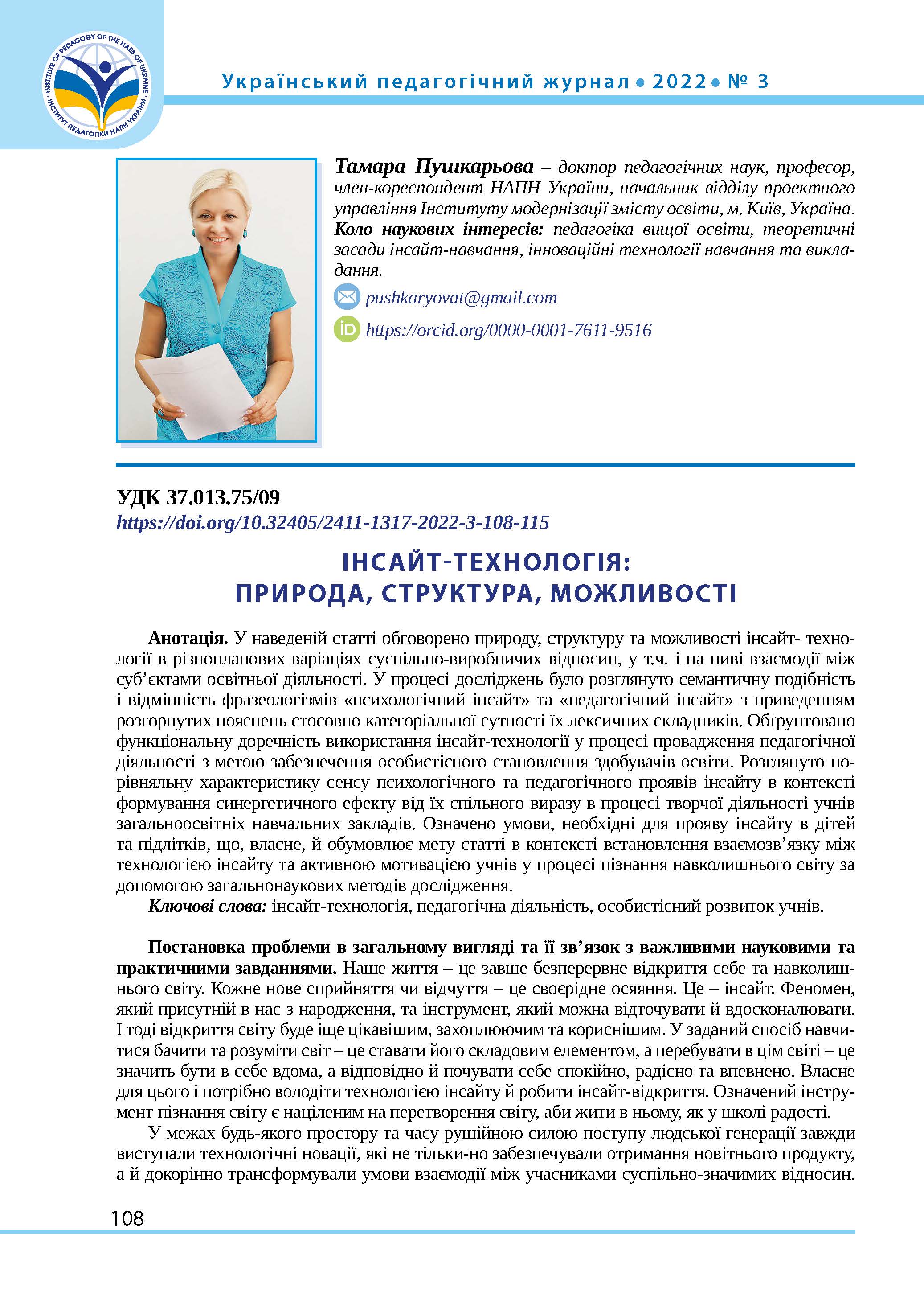Abstract
Our life is always a continuous discovery of ourselves and the world around us. Each new perception or feeling is a kind of enlightenment. This is an insight. A phenomenon that is present in us from birth and a tool that can be sharpened and improved. And then the discovery of the world will be even more interesting, exciting and useful. To learn to see and understand the world in a given way is to become its constituent element, and to be in this world means to be at home, and accordingly to feel calm, joyful and confident. Actually, this requires mastering he technology of insight and make insight-discovery. The designated tool for learning about the world is aimed at transforming the world in order to live in it like in a school of joy.
Within any space and time, the driving force of the progress of the human generation has always been technological innovations, which not only provided the latest product, but also fundamentally transformed the conditions of interaction between the participants of socially significant relations. The complication of forms of production of material goods, for its part, always and still needs not only qualified and knowledgeable specialists, but also creative performers.
The article discusses the nature, structure and possibilities of insight technology in different variations of social and industrial relations, including the field of interaction between subjects of academic activity. During the research was considered semantic similarity and difference of the phraseological units "psychological insight" and "pedagogical insight", with detailed explanations regarding the categorical essence of their lexical components. The functional expediency of using the insight technology in the process of pedagogical activities to ensure the personal development of students is substantiated. The comparative characteristics of the meaning of psychological and pedagogical manifestations of insight in the context of the formation of a synergistic effect from their joint expression in the process of students' creative activity of students in general educational institution are considered. Necessary and sufficient conditions have been identified, which not only prepare students for the manifestation of the phenomenon of insight, but also contribute to the consolidation of creativity skills in fantasizing, inventing, constructing, reasoning, etc.
References
Віг, Н. (1988). Технологія, філософія і політика. Технологія і політика, 7‒15.
Демиденко, Г.Г., Петришин, О.В. (2009). Історія вчень про державу і право. Право.
Загарницька, І. (2011). Соціалізація дитини: сутність, фактори, технології. Нова парадигма, (104), 41‒51.
Макарова, В.В. (2022). Інсайт-технологія при формуванні купівельної поведінки споживачів за умов запровадження маркетингу відносин. Агросвіт, (1), 20‒26. www.agrosvit.info/1_2022/4.pdf
Матвієнко, В. (2001). Соціальні технології. Українські пропілеї.
Мельничук, О.С. (Ред.). (1985). Словник іншомовних слів. Головна редакція Української радянської енциклопедії.
Сковорода, Г. (2005). Твори в 2-х томах. Трактати. Діалоги. Притчі. Переклади. Листи (Т. 2). Обереги.
Сухомлинский, В.А. (1977). Павлиська середня школа; Розмова з молодим директором. Вибрані твори в 5 т. (Т. 4). Радянська школа.
Фовлер, С. (2018). Націлені на результат. Що насправді мотивує людей (Ю. Кузьменко, Пер.). Наш формат.
Demydenko, H.H., Petryshyn, O.V. (2009). Istoriia vchen pro derzhavu i pravo. Pravo.
Fovler, S. (2018). Natsileni na rezultat. Shcho naspravdi motyvuie liudei (Iu. Kuzmenko, Per.). Nash format.
Makarova, V.V. (2022). Insait-tekhnolohiia pry formuvanni kupivelnoi povedinky spozhyvachiv za umov zaprovadzhennia marketynhu vidnosyn. Ahrosvit, (1), 20‒26. www.agrosvit.info/1_2022/4.pdf
Matviienko, V. (2001). Sotsialni tekhnolohii. Ukrainski propilei.
Melnychuk, O.S. (Red.). (1985). Slovnyk inshomovnykh sliv. Holovna redaktsiia Ukrainskoi radianskoi entsyklopedii.
Skovoroda, H. (2005). Tvory v 2-kh tomakh. Traktaty. Dialohy. Prytchi. Pereklady. Lysty (T. 2). Oberehy.
Sukhomlynskyi, V.A. (1977). Pavlyska serednia shkola; Rozmova z molodym dyrektorom. Vybrani tvory v 5 t. (T. 4). Radianska shkola.
Vih, N. (1988). Tekhnolohiia, filosofiia i polityka. Tekhnolohiia i polityka, 7‒15.
Zaharnytska, I. (2011). Sotsializatsiia dytyny: sutnist, faktory, tekhnolohii. Nova paradyhma, (104), 41‒51.

This work is licensed under a Creative Commons Attribution-NonCommercial-ShareAlike 4.0 International License.


